Pam Templer Featured in the Brink
Congratulations to Dr. Pamela Templer for her feature in the Brink article titled, “Building a Diverse, Strong Climate Workforce.” On June 9, 2022, Climate advocates from around the world teamed up with BU to brief Congressional staff on their plan to train the next generation for careers in solving the current climate crisis.
Climate change is a global issue demanding we adapt to the changing world and transition to the use of sustainable resources. As climate change accelerates, the US will face challenges ranging from extreme weather events to water and air pollution. To discuss these issues, a virtual panel is known as Building the Next Generation Climate Workforce: Innovative Solutions from Around the Country came together with the goal of using sound-science policymaking to expand diversity in STEM and prepare to meet energy demands from renewable sources.
Dr. Templer described to the Brink:
“To me, a climate workforce means successfully preparing our graduates to tackle climate challenges. We know that temperatures are rising, weather events are becoming more extreme, and these are all impacting human health and well-being. Having graduates understand how we can both reduce the greenhouse gas emissions that lead to climate change and create solutions to help humans adapt to the ways that climate is already changing is essential.”
In addition, all panelists at this briefing expressed their hope for greater federal funding for training students interested in climate-focused careers, as it would increase the diversity and opportunities for communities that are directly impacted by the consequences of climate change.
Click here to read the full article.
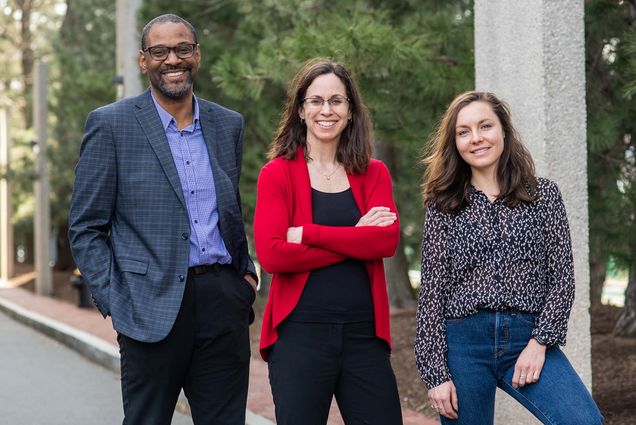
Meg Younger Featured in the Brink
Biology Assistant Professor, Dr. Meg Younger, is featured in a Brink article titled, “Mosquitoes have a Bizarre Sense of Smell, Study Finds.” The article discusses how mosquitoes have an unconventional method of detecting odors which could explain their ability to detect humans to pray on. Mosquitoes are the most deadly insects in the world due to their ability to transmit vector-borne diseases such as malaria, West Nile virus, Zika virus, dengue, and more.
Dr. Younger and her team are investigating how mosquitoes utilize odor to track humans, and an effective way to repel mosquitoes. They found that Aedes aegypti mosquitoes thrive in tropical climates. These mosquitoes have typically been found in equatorial states such as Florida and Texas, however, in recent years, they have been detected as far north as Connecticut due to global warming. Climate change has increased the pressure of understanding the odor mechanisms of mosquitos.
The study finds that Aedes aegypti mosquitoes’ olfactory system is organized by gene coexpression with multiple sensory receptors in each neuron. A uniquely specialized olfactory system offers an explanation regarding mosquitoes’ sensitivity to humans.
In her lab, Dr. Younger and her team have developed mosquitoes that express fluorescent proteins, allowing researchers to see chemical responses to odorants under a microscope. CRISPR technology was used to label various sensory neurons while preserving cell protein function.
The results of the study ultimately show that the Aedes aegypti mosquitoes have a unique olfactory system that coexpresses sensory receptors within individual sensory neurons, and this might heighten their ability to detect human odor.
Dr. Younger is now interested in investigating the role of coexpression in Aedes aegypti mosquito behavior:
“A compelling idea is that it’s making them good at finding people. As we learn about how odor is encoded in their olfactory system, we can create compounds that are more effective based on their biology.”
To read the full article click here.

January 7, 2020
Leslie Vosshall Lab
Photography by John Abbott
Richard Primack Interviewed for Article in CTInsider
Dr. Richard Primack was interviewed by CTInsider regarding the effect of drought on Connecticut fall foliage this past year. Primack describes how during years with extremely dry conditions, New England trees tend to experience senescence before displaying vibrant colors.
He elaborates,
“If plants are experiencing drought, then the leaves will not undergo this normal slow process of color change — the leaves will just simply die.”
However, climate change tends to counteract the effects of droughts on tree foliage color change due to normal or excess precipitation. Temperature is another factor to consider. Over the past decade, the foliage in New England has been reaching its peak growth later in the season due to rising temperatures, delaying the autumn season. Increased temperatures due to climate change also allow invasive species to reproduce. And during years of drought, trees experience increased water stress, making them more susceptible to insects and diseases. Lastly, Primack describes how unpredictable weather is something to consider:
“Trees really thrive on predictable, constant weather conditions. And when we have these very unusual conditions, it makes the tree susceptible to drought, and it makes them very vulnerable to disease. And therefore, they wind up getting sick and sometimes dying.”
To read more about the effects of climate change on New England trees, please click here for the full article.
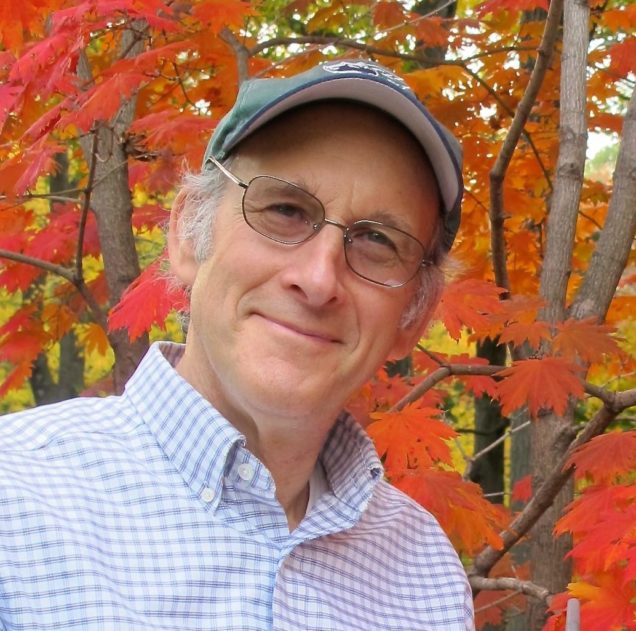
Michael Sorenson featured in PNAS
Congratulations to Dr. Michael Sorenson for being featured in the Proceedings of the National Academy of Sciences (PNAS) journal article.
Sorenson collaborated with a team consisting of Katherine Stryjewski of Harvard University, Jeffrey DaCosta of Boston College, Evan Kuras of BU Urban Program, and collaborators at Cambridge University and farms in Zambia's Southern Province. Their work was featured in an article titled, “Genetic architecture facilitates then constrains adaption in a host-parasite coevolutionary arms race.” The paper discusses the inheritance of egg mimicry genes, referring to the shared behavior of egg mimicry of the parasitic European cuckoo finch. The European cuckoo targets various species by laying eggs similar to that of another species. By another species accepting these eggs, the cuckoo finch does not need to expend the additional energy required to hatch and look after its young.
Dr. Sorenson describes this phenomenon as an “escalating arms race” due to coevolution. As the cuckoo finch adapted the ability to produce eggs that are similar to other species, these species have become more vigilant at identifying and discarding foreign eggs.
To read more about the study, please click here.
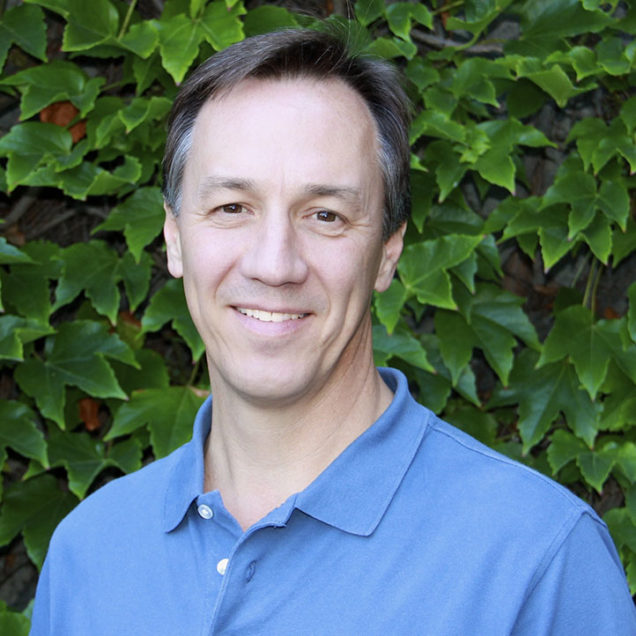
Congratulations to Dr. Michael Sorenson and his collaborators!
Tom Gilmore Renews BU SURF Award
Dr. Tom Gilmore received funding for BU’s SURF Program. The Summer Undergraduate Research Fellowship (SURF) program is dedicated to promoting access to graduate education for talented undergraduate students, specifically, those from minority groups that are underrepresented in the sciences. The program is funded by the National Science Foundation (NSF-REU) and Boston University. It is open to rising junior and senior students outside of Boston University with interests in conducting research in the sciences or technology-related fields. Students have the opportunity to work full-time for 10 weeks in a BU lab and be mentored by a BU faculty member. More information on the program can be found here.
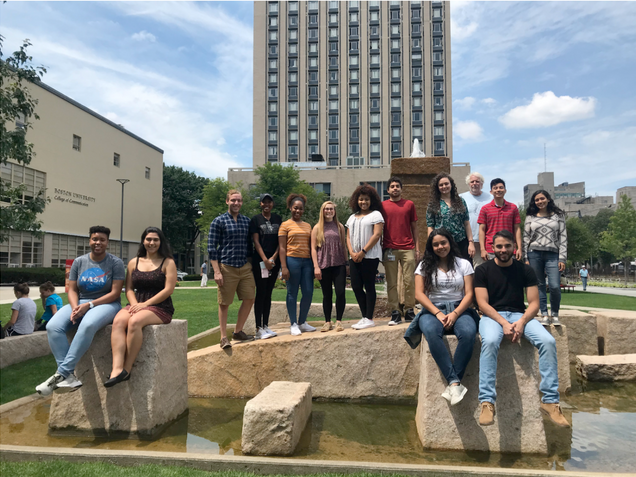
Sarah Davies Wins the ARROWS Mary Eskrine Award
Congratulations to Sarah Davies for Winning the ARROWS Mary Eskrine Award. The Mary Eskrine funding award is given to BU STEM faculty members to fund professional development activities that support the BU community of women and other underrepresented genders in STEM. This July, Dr. Davies attended the 15th International Coral Reef Symposium (ICRS) in Bremen, Germany with five BU graduate students working in her lab and an NSF REPs fellow.
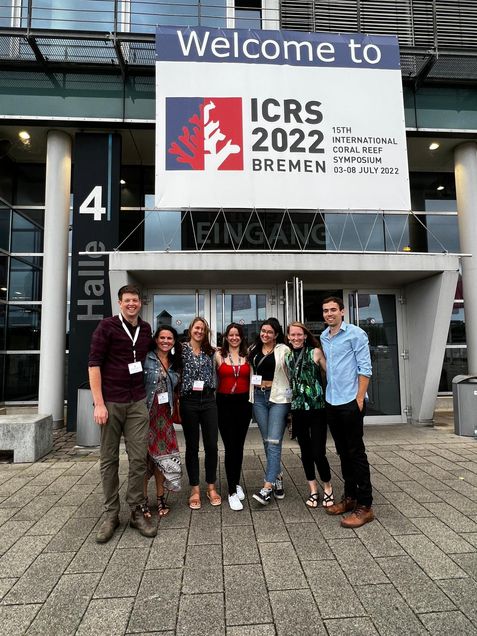
Together they presented six oral presentations and one poster. Dr. Davies organized a workshop called, “How can we develop tools and best practices to accurately delimit Symbiodiniaceae diversity in reef research?” She was also the chair of a coral restoration genetics session as well as a plasticity and adaption session. In addition, Dr. Davies was awarded a pin for becoming an ICRS Fellow. Dr. Davies used the funds from the Mary Eskrine award to cover travel and registration costs.
Dr. Davies describes the most rewarding part of her job as mentoring her students:
“Watching my Ph.D. students and my technician up in front of an international room of the top reef scientists, delivering amazing talks and answering questions seamlessly was very fulfilling. I was really proud of the awesome science we delivered and it was also just really great to be together networking with many folks from all over the world.”
Congratulations to Dr. Sarah Davies and her team!
Brandon Güell Wins BU’s Inaugural Research Photo Contest
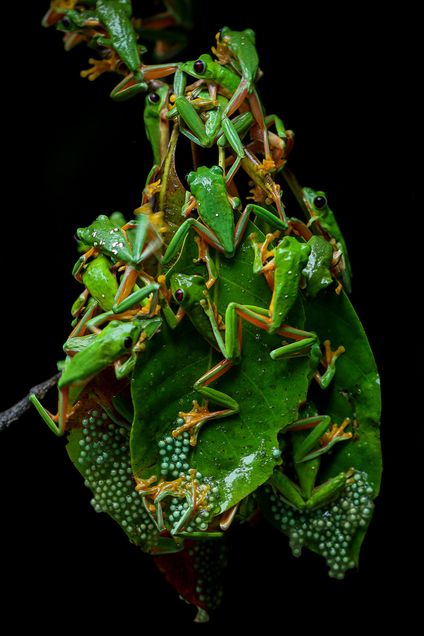
PhD candidate Brandon Güell of the Warkentin Lab is the winner of BU's inaugural research photo contest in the field research category (entry pictured above). The competition had more than 120 entries in three categories—field research, research happening at BU, and research imaging—with three winners and six runners-up chosen by a panel of faculty and staff judges.
Winners were announced during the Kilachand Day celebration on September 27th and featured in The Brink. Read the full article and see the other winners and runners-up here.
Congratulations, Brandon!
Congratulations to Cynthia Bradford for Winning the 2022 Perkins Award

John S. Perkins Award Ceremony in the Metcalf Trustee Center on May 3, 2022.
Photo by Jake Belcher for Boston University Photography
Congratulations to Cynthia Bradford for winning the 2022 John S. Perkins Award for her outstanding long-term service at the College of Arts & Sciences, Department of Biology. As a proposal development specialist, Cindy has gathered grant proposals, which have received 70 awards, totaling over twelve million dollars in funding within the past year alone. According to CAS Professor and former Chair of Biology Kimberly McCall, Cindy’s ability to gather potential grants for faculty and review final applications saves Biology faculty hours of time.
In 1982, Cindy started her work at BU as an Administrative Assistant for a recently formed neuroscience research center called Adaptive Systems. She held multiple titles such as assistant director of the Center for Adaptive Systems and Administrative Director of the Center of Excellence for Learning in Education, Science, and Technology (CELEST), Associative Director of the Center for Computational Neuroscience and Neural Technology (CompNet), and Editorial Assistant for the international journal Neural Networks. By 2015, she began working with BU Biology Department as the Proposal Development Specialist for the Department of Biology. Cindy describes her experience as,
“One that no one else had held before. I had the responsibility and also the pleasure of designing and implementing the administrative procedures.”
Since 2016, she has served as one of the inaugural members of the BU-wide Advisory Council on Research Administration (ACRA).
When asked about her reaction about receiving the reward, Cindy replied,
"I felt very humbled and still do. Of course, I would hope to be doing a good job always but to be recognized by colleagues and in such glowing terms is a moment to treasure. It’s also important to say here that sponsored research is always a group effort and several BU colleagues, in particular, deserve public thanks for any success I have enjoyed. Cynthia Kowal and Dolores Markey have been valued mentors, and in more recent years Danielle Van Vooren has been invaluable for her guidance and support during my time in Biology."
Starting this September, Cindy formalized her retirement from BU. In conclusion of her career in the Department of Biology, she states,
"The work has been fascinating. I’m going to miss the intellectual stimulation—and seeing the baby geese along the Charles each spring—but I will miss the people the most, some of whom have become good friends over the years."
Congratulations Cindy, and thank you for everything!

John S. Perkins Award Ceremony in the Metcalf Trustee Center on May 3, 2022.
Photo by Jake Belcher for Boston University Photography
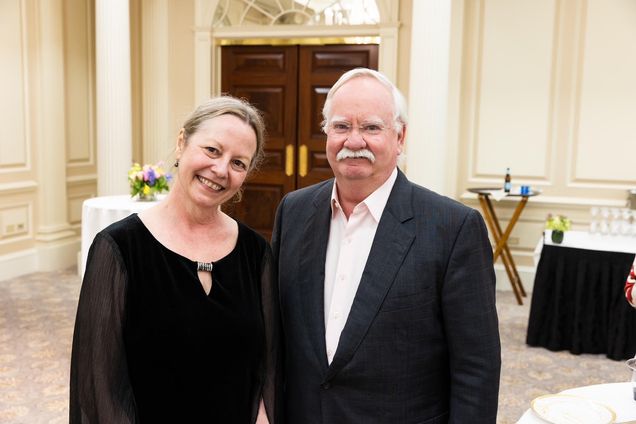
John S. Perkins Award Ceremony in the Metcalf Trustee Center on May 3, 2022.
Photo by Jake Belcher for Boston University Photography
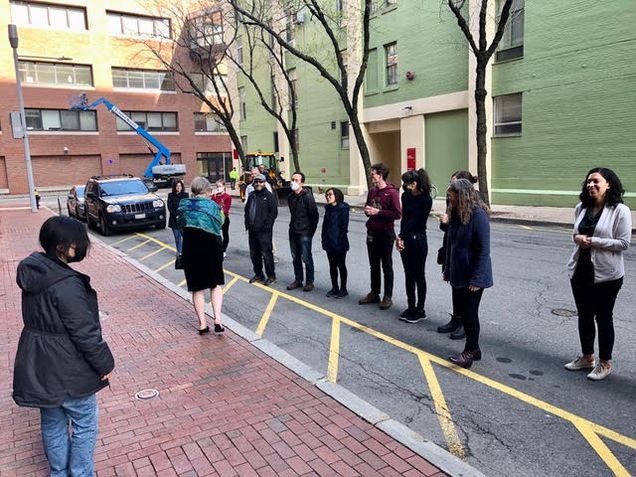
Spring 2022 Undergraduate Research Award Winners

Congratulations to Maria Salgado Patino, Russell Laman, and Jamie Li for receiving the Spring 2022 Undergraduate Research Award. This annual award is given to outstanding seniors of any major who are performing research in Biology Department labs by the Biology Research and Honors Committee.
Maria Salgado (Neuroscience and Psychology) conducted her research on a non-canonical mechanism of complement 4-Driven Cortical Synaptic Loss in the Cruz-Martín Lab.
Russell Laman (Biology with specialization in Ecology & Conservation Biology and Marine Science) did research using photomosaics to analyze the structural complexity and conservation success of restored Belizean coral reefs in the Kaufman Lab.
Jamie Li (Biochemistry & Molecular Biology) carried out her research on the regulation of indole glucosinolate and melatonin production in arabidopsis thaliana in the Celenza lab.
Congratulations to Maria, Russell, and Jamie!
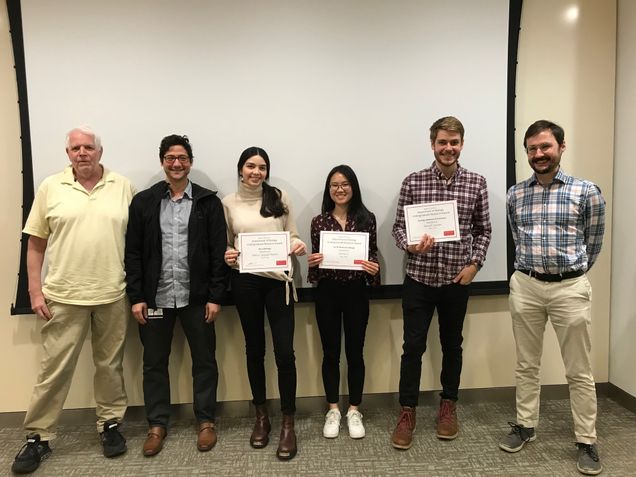
Brandon Güell Among Wildlife Photographer of the Year Winners

PhD candidate Brandon Güell of the Warkentin Lab is among the list of winners for the Natural History Museum's Wildlife Photographer of the Year for his entry "Treefrog Pool Party" (pictured above).
You can read more about his winning shot and explore some of the other entries here.
Congratulations, Brandon!